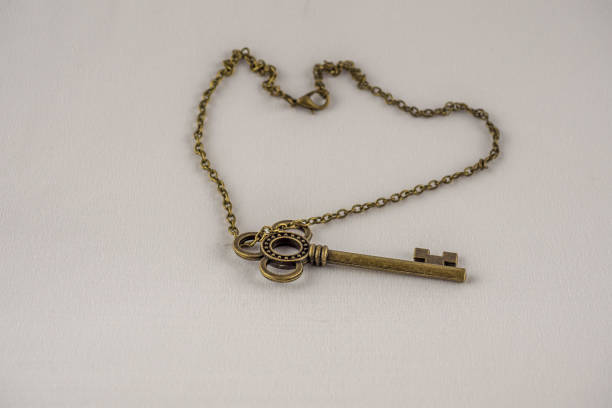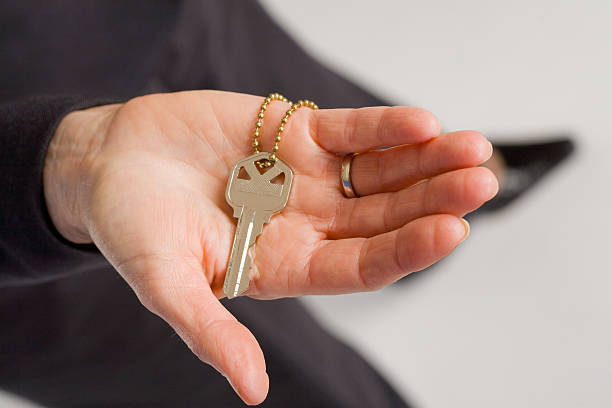Wearing a key around your neck often carries a myriad of personal and symbolic meanings. While some may regard it merely as a trend, a key can symbolize much more, from access and trust to freedom and responsibility. From ancient times until today, the humble key has held significant weight in various cultures and contexts, opening more than just physical locks, but unlocking personal narratives and potential.
Historical Context and Symbolism
Keys in Ancient Cultures
In ancient civilizations, keys were symbols of power and exclusivity. The Romans, for instance, would often use bronze key pendants as indicators of status, signifying the bearer’s authority to unlock precious storages or sacred places. In these times, women wore key necklaces to symbolize their role as the caretaker of the household’s wealth and wellbeing, a tradition done so with great pride.
The Key in Literature and Mythology
Throughout literature and mythology, keys have also played a pivotal role in narratives and parables. For example, in Medieval folklore, keys could symbolize the unlocking of secret knowledge and the mystery of the unknown. They were often worn by figures associated with guidance and insight, inferring that they had access to otherwise hidden truths.
Religious and Spiritual Significance
Keys hold substantial weight in religious contexts as well. In Christianity, the Key of Heaven, represented by a gold or silver key, is an emblem often associated with Saint Peter, believed to be the gatekeeper of Heaven. Here, the implied meaning transcends the physical, suggesting a spiritual significance tied to salvation and eternal life.

Contemporary Interpretations
Fashion Trend and Personal Style
While key necklaces remain a striking fashion statement symbolizing individuality, they also carry intrinsic value beyond their aesthetic appeal. Key pendants are often used in jewelry design not only for their visual aspect but as a statement piece that communicates personal narrative or style preference.
Keys as a Symbol of Trust and Responsibility
The gifting of a key could also represent the entrusting of something valuable, whether that is a property, a secret, or someone’s heart. It’s a gesture indicating that the recipient holds a significant place of trust and responsibility in the life of the giver. For example, a parent will not lightly hand over the keys to their car to a young driver without an accompanied sense of confidence and duty.
Commemorative and Memorial Significance
Key necklaces might not only be worn for their symbolic meanings but could also serve as commemorative pieces. Lock necklaces or key chains, for example, often feature personalized elements and are worn in memory of lost loved ones or significant life events.
Psychological Implications of Wearing a Key
The psychological effects of wearing a key are tangible. For some, it instills a sense of security and control, perhaps representing guardianship or the comfort of home. For others, a key pendant might not provide literal access but might represent an internal unlocking of personal barriers or the pursuit of freedom from psychological constraints.
| Topic | Explanation |
|---|---|
| Symbolism | Wearing a key around the neck can symbolize various things such as access, opportunity, secrets, and responsibility. |
| Security | Some individuals wear a key as a symbol of security, either physical or emotional, representing their ability to protect themselves or others. |
| Unlocking Potential | For some, wearing a key may represent unlocking one’s potential or opportunities in life, signifying a belief in personal growth and development. |
| Personal Significance | The significance of wearing a key around the neck can vary greatly depending on personal experiences, beliefs, and cultural influences. |
| Expression of Identity | It can serve as a form of self-expression, allowing individuals to communicate aspects of their identity or values to others. |

Personal Stories and Cultural Differences
Personal Narratives on Key Necklaces
The personal attachment one has to a key necklace cannot be understated. For some, it could be a cherished item passed down through generations, laden with family history and stories. Others might select a key pendant as a token of self-expression, finding in its design a resonance with their own life journey. For instance, an artist could choose a vintage key as a symbol of unlocking creativity or embracing the nostalgia of bygone eras.
Variation in Meaning Across Cultures
Around the world, key necklaces are perceived differently. In some cultures, they are often used as amulets believed to ward off evil spirits or bring good luck. In contrast, others view them as mere fashion accessories, with no significance beyond their aesthetic. Even within the same culture, interpretations will vary from person to person, often shaped by individual experiences and values.
Choosing the Right Key for Yourself
Considerations for Material and Design
When selecting a key necklace, several factors come into play. Material and design are pivotal, as they not only contribute to the appearance but may also carry symbolic weight. Silver and gold keys often denote purity and wealth, respectively, while rustic iron could symbolize strength and resilience. The intricacy of the key’s design might reflect the complexity or simplicity preferred in one’s life approach.
Infusing Personal Meaning into Your Key Necklace
To truly make a key necklace your own, you could also embed it with personal significance. Engraving initials, significant dates, or inscribing meaningful words transforms the key from a simple object to a storied artifact of one’s personal history. Each additional element—be it a gemstone, charm, or emblem—enriches the narrative your key necklace carries.

Conclusion
In essence, the act of wearing a key around one’s neck transcends a mere fashion statement; it is a powerful symbol that has evolved through centuries, embedding itself in tradition and culture. Key necklaces offer a versatility of meanings—ranging from trust, responsibility, and security to freedom, potential, and personal growth. Whether it serves as an emblem of authority, a fashion choice, a treasured memory, or a spiritual talisman, the key holds a personalized resonance that is as unique as the individual who chooses to wear it.
FAQ Section
- What does it mean when someone gives you a key necklace? When someone gifts you a key necklace, it is often a sign of deep trust and affection. It might symbolize the granting of access into an aspect of their life, be it literal or metaphorical, and is a gesture that speaks of significant personal connections.
- Can wearing a key necklace bring good luck? In some cultures, keys are considered to bring good fortune and are worn as talismans. While the belief varies from person to person, many choose to wear key necklaces with the hope that it will unlock positive pathways and opportunities.
- How do I choose the right key necklace for myself? Choosing the right key necklace for yourself involves reflecting on what resonates with you personally. Consider the aesthetics, the material, any potential engraving, and, most importantly, what the key represents in your life. It should be a reflection of your identity or aspirations.
- Are there any occasions where wearing a key necklace could be seen as inappropriate? Generally, key necklaces are versatile and can be worn in most settings. However, some formal events or professional environments might warrant a subtler approach to jewelry. It is also essential to be mindful of specific cultural contexts where a key symbol could carry different connotations.
- Is there a difference between key necklaces for men and women? While the symbolism of keys remains the same, the design of key necklaces can vary. Men’s key necklaces might feature more robust, minimalistic designs, while women’s versions could be more delicate or ornate. Ultimately, the decision should be guided by personal style preferences rather than gender norms.





